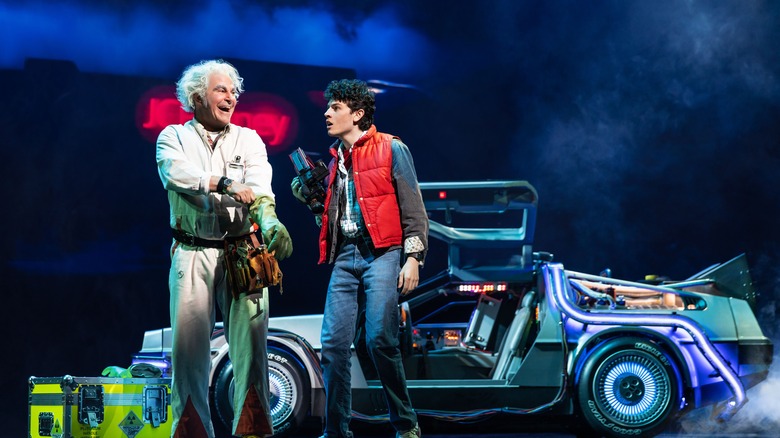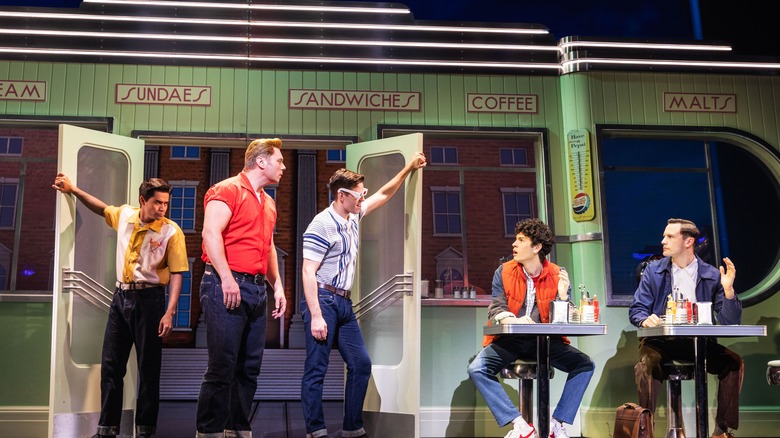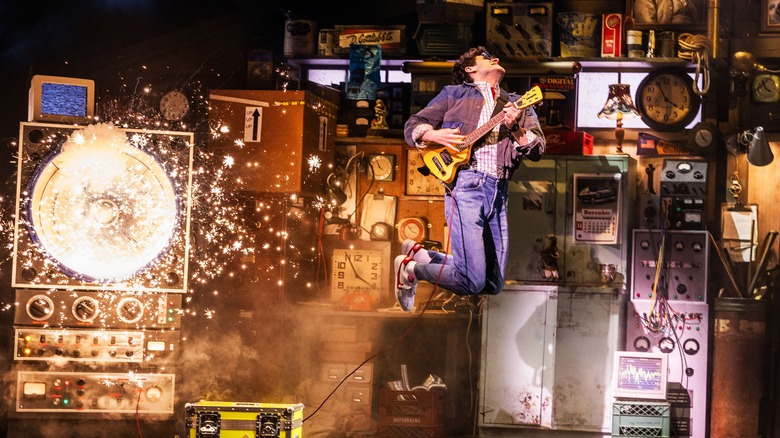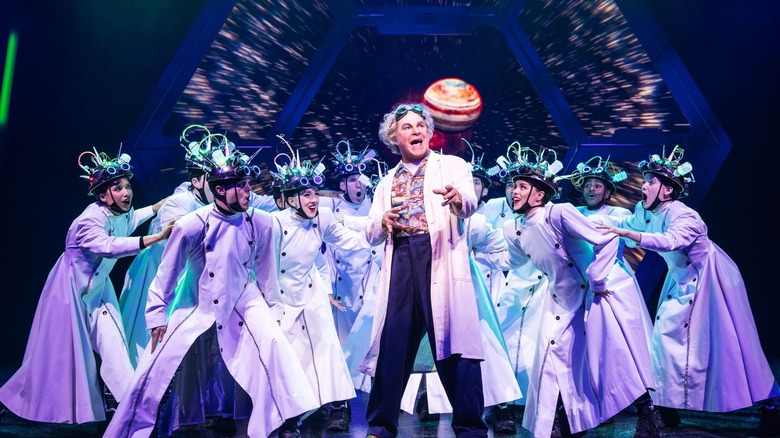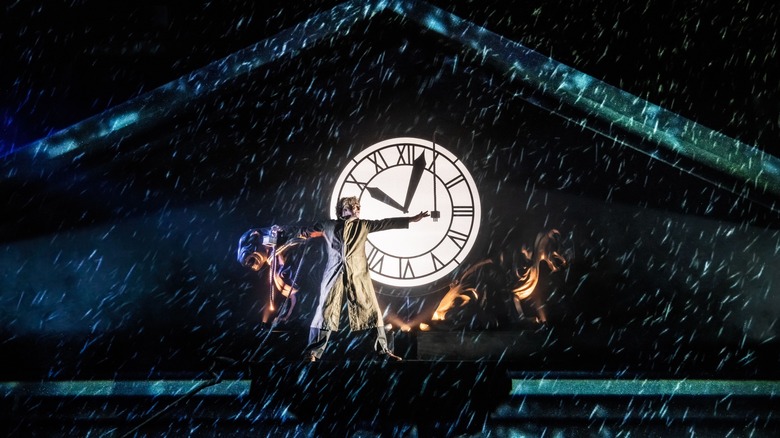Back To The Future: The Musical Review: The Classic Time Travels To Broadway With Mixed Results
This review contains spoilers for the show's visual surprises.
The original 1985 "Back to the Future" movie is a fantasy. It's a teen time travel fantasy about knocking sense into your disappointing parents and ensuring they grow into better people. It's a fantasy where "If You Put Your Mind To It, You Can Accomplish Anything" pays dividends as an adage. It's also a visual effects dream — courtesy of its director-screenwriter Robert Zemeckis and ILM — that rode the waves of critical and commercial success, two sequels, pop culture homages, and now a "Back to the Future: The Musical."
The famed DeLorean time machine skids onto Broadway's Winter Garden stage, as the West End version dances on. Within a few blinding flashes, the vehicle pops up like magic thanks to Chris Fisher's illusion work and Tim Lutkin & Hugh Vanstone's tactful lighting. Its 3D scan designed by Tim Hatley, the DeLorean feels alive. With 1.21 gigawatts, it vrooms and swerves to Gareth Owen's sound design. It speaks with a computer voice (a stage-exclusive upgrade that isn't exploited much). It also flies and penetrates the fourth wall at the finale, much to the audible wows and the neck-straining head tilts of the first five center-orchestra rows. So jaw-dropping like the bygone chandelier of "Phantom of the Opera" that you might forgive when "Back to the Future: The Musical" stumbles.
Vintage story
Declared the "gatekeeper of the franchise" in the playbill, the film's screenwriter Bob Gale returns as bookwriter to give the iconic Doc and Marty (originated by Christopher Lloyd and Michael J. Fox, respectively) a retreaded map of the first film. In the year 1985 in Hill Valley, California, aspiring rock musician Marty McFly (Casey Likes) can't catch a break. Reeling from a failed audition, he's exasperated by his unremarkable family, especially that of his pushover father, George McFly (Hugh Coles, alumni from the West End), and his vodka-loving mother, Lorraine (Liana Hunt).
Marty's life takes a turn when his friend, the mad scientist Dr. Emmett "Doc" Brown (Roger Bart, West End alumni), shows off his plutonium-fueled time machine, the DeLorean. However, a bout of radiation poisoning slams Doc (no Libyan terrorists in this version). In an attempt to help, a desperate Marty accidentally hurtles the DeLorean 30 years back into the year 1955. So the teen searches for the past Doc to find a clear return route to 1985, but he overcomplicates matters when he unwittingly sabotages the courtship of his younger parents. When Lorraine falls for Marty instead of George, he finds himself in danger of wiping out his future existence. So it's up to Marty to romantically re-link his parents together to secure his future, all while he and the younger Doc scheme to re-fuel the DeLorean back into 1985.
The nostalgic catalog
With the film's composer Alan Silvestri returning to do the music, the show's original songs are 50-50 in passable quality. Despite some jammable pop, there's little compelling in Glen Ballard's lyricism. Embodying the fun petty evil of Biff's character, Nathaniel Hackman struggles to bluster up his inert villain number "Teach Him A Lesson." Tellingly, Silvestri's signature fanfare melody is injected into "It's Only A Matter of Time" and its reprises for nostalgic snags. Likewise, the movie's oldies like Chuck Berry's "Johnny B. Goode" and Huey Lewis' "Back in Time" and "The Power of Love" also resurface into exuberance. Among boilerplate ballads or clunky compositions, there are functional songs like the pastiche "Pretty Baby" (playing effectively off the cringe hilarity of Marty's mom seducing her son) or Doc Brown's techno-fantasia "21st Century" (the showstopper where the musical steps into its own electric dreamworld outside the plot). Even through the lesser songs, it's a testament to Rando's staging and Chris Bailey's ensemble choreography that they can keep the entertainment engines going at 88 mph.
The cast
The human engine of the "Back to the Future" trilogy has always been the odd couple behind the DeLorean's wheel. Aficionados of the IP may be relieved to hear that their stage counterparts share a chemical bond, dressed in Hatley's costume design replicating their iconic attires. Hewing close to the spirit of McFly's onscreen originator Fox, the orange-vested Likes grooves with his own charisma. If his "Almost Famous: The Musical" leading role hinted at a star coming out of his shell, Likes relishes his newfound comedic freedom as he tackles Marty's bemusement at compromising situations. He bounces off the kooky Bart, donning Doc Brown's lab coat and radiation suit. Bart also pulls off the pained undercurrent in Doc's behavior when he peeks into his mortality. Lloyd is imitable, but Bart drops his indelible mania on Doc Brown.
Viewers can savior the charms of "Back to the Future" while recognizing it as a time capsule. In 2023, Gale's musical bookwriting does little to rethink the movie's aged aspects. If there's a Silvestri-Ballard number that pays amusing lip service to the dated '50s lens, "Cake" paints a satirical postcard paean to chemical-slogged lily-white suburbia ("All of these white men / Get to have their cake / So let the women bake"). Beyond that, the musical doesn't sweat its dated politics, sometimes amplifying them. Played by Coles with whispery wheeziness, secondary hero George McFly is still a Peeping Tom and fits into that A-ok dated heroism of manhood because he punches a would-be rapist. On the other end, a sincere Hunt can only do so much for the underserved Lorraine, who doesn't get as much individual interiority as George. Also recall in the film how Marty gives Goldie Wilson (a mesmerizing Jelani Remi, who doubles as Marvin Berry), a Black cafe sweeper, the idea to run for mayor in the future. Here, Goldie erupts into a "You Gotta Start Somewhere," a good-intentioned showstopper that ends up exalting the ultimate white vision of pulling yourself up by the bootstraps. (It's worth mentioning one interaction where Remi rounds out Goldie's ongoing journey with a chilly "goodnight," in which this single delivery suggests more depth than the book and lyrics.)
Look, something shiny!
The musical is good at pointing and saying, "Look, something shiny or cool!" So if the musical dips into an underwhelming song or misfires a gag (like Marty brandishing a lightsaber in an attempt to substitute an inadaptable film quote), the production's hyperactivity and spectacle can draw you back in. Props sizzle with pyrotechnics and Finn Ross's video designs zip like "2001: Space Odyssey" stargating. Not least of all, the clocktower climax glides like cinematic crosscutting thanks to the coordinated projection and sets.
Selling tickets from about $109 to $297, the musical so far is raking in a consistent $1-million-a-week grossing. Not to mention that it announced its North American tour before the Broadway premiere. Based on this, it's gaming to be a juggernaut money-maker. If you already harbor affection for the original movie, there's a high probability that the nostalgic currency will court your purchase (and, anecdotally, the snap-cackle magic enthralled a seatmate who had not experienced the movie). Just don't expect any fresh revelations in the writing. Though, there is a line that implies Doc Brown worked on the Manhattan Project. Rest assured, this musical ensures that you do not ponder this.
"Back to the Future: The Musical" is playing at the Winter Garden Theatre on Broadway.
